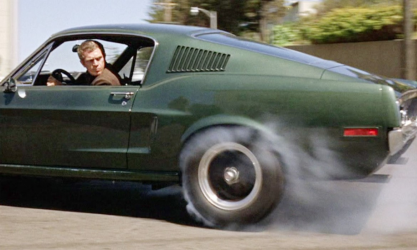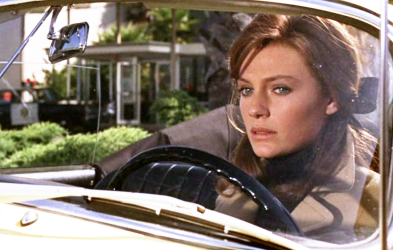Some say director Peter Yates will be best remembered for his sword and sorcery epic Krull, others insist it will be introducing the world to a young Harvey Keitel in Mother, Jugs and Speed, and still yet others say his Jaws-inspired (and even more inspired Jacqueline-Bisset-in-a-wet-T-shirt showcasing) The Deep—can I stop here? This is a dumb bit. Yates did a lot of good movies, and some less good movies. Bullitt would be in his top 5, typically behind such films as Breaking Away and The Dresser.
But neither of those films has Bullitt‘s iconic status. Or Steve McQueen.

How can he be cool when he hurts the environment so callously?
I think I said Dirty Harry was the prototype for all those ’70s detective shows but Bullitt hits almost all the same notes—and preceded that franchise by three years. Steve McQueen plays a rebel cop—he’s actually more laconic than Eastwood’s Callahan—who bucks the system (sorta) to bring down a connected mob stoolie (sorta). The only thing missing here is the cliché (maybe not yet firmly established) of his police bosses being in on it. No, curiously, and perhaps more realistically, the bosses are stupid and self-aggrandizing but not actually in on it.
This movie actually has a lot of what I hate about movies of the era, but I don’t hate them here: Muted color schemes (but still Technicolor!), existential ennui (it’s not overdone), a lot of stretches with just ambient sound and no music, brassy score when there is music (but Lalo Schifrin!), a lot of scenes which seem almost cinema verité for “realism”, a similarly “realistic” low-key quality, and so on.
The highlight of the film is a bravura car chase, most of which done by Steve McQueen himself, which probably explains the next ten years of movies and TV. I’m not much of a car chase guy but this is a good one.

Pictured: A car chase.
Some things that I found interesting: A realistic hospital sequence which is not all that gripping, but which is an interesting reminder of how much technology and lawyers have changed things in the past 50 years; gratuitous Vic Tayback; An airport sequence where Bullitt must chase down the bad guy but he can’t spot the bad guy because almost every man in the airport is in a suit!; 24-year-old Jacqueline Bisset who reminded me of how grownup 20-somethings used to be expected to be, and who reminded me strongly of an occasional blog commenter; Robert Vaughn’s complaint that this movie ruined his political ambitions—as if Teenage Caveman hadn’t done that; Norman Fell! As a toadying chief of police!; Robert Duvall still doing, essentially, whatever roles he could pick up; the protocols that Bullitt violates seeming a lot more realistic and restrictive (like failure to report a suspect dying) than those that later movie cops would violate (like blowing up buildings); $8 hotel rooms, and a myriad of other details, large and small.
Oh! No sex scenes yet. I’m trying to pinpoint when the sex scene became mandatory in movies. (The sex scene ceased to be mandatory somewhere in the mid-’80s. See Top Gun.) Dirty Harry didn’t have one either, but the sequel did, as I recall.
But if I had to guess why I liked this movie where subsequent similar films would leave me cold, it’s that there isn’t the same moral ambiguity in the later films. Bullitt’s struggle is that his job forces him to confront evil. It throws violence in his face. It’s not that the bad guys aren’t bad, or aren’t so bad, or that the good guys aren’t—well, okay, the “good guys” here aren’t great, but that’s at the higher political level, not at the “working-cop” level. The point is, I think as the years passed, the ugly aspects of aesthetic got uglier: Confusion/questioning gave way to nihilism, muted colors gave way to ugly colors, jarring violence got more violent and consequently less jarring—which is jarring in a different sense.
Anyway, we can’t really hold this movie responsible for the future; we were glad we saw it.

Questioning whether or not dating Steve McQueen is worth it.

One thought on “Bullitt (1968)”